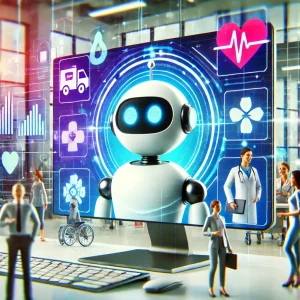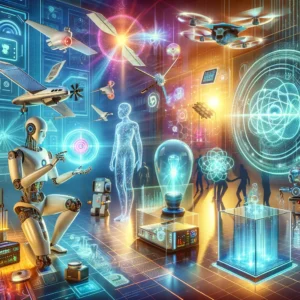How Chatbots Are Improving Customer Service Across Industries

How Chatbots Are Improving Customer Service Across Industries.
Discover how chatbots are transforming customer service across industries. Learn about their benefits, applications, and the future of AI-powered customer support.
Chatbots have revolutionized the way businesses interact with customers, becoming an essential tool in enhancing customer service. Powered by artificial intelligence (AI), chatbots provide quick, efficient, and round-the-clock support to customers across various industries. From resolving simple inquiries to streamlining complex processes, the impact of chatbots is undeniable.
In this article, we’ll explore how chatbots are transforming customer service and the benefits they bring to businesses and consumers alike.
—
The Rise of Chatbots in Customer Service
The growing popularity of chatbots is driven by advancements in AI, natural language processing (NLP), and machine learning. These technologies enable chatbots to simulate human-like interactions, understand context, and provide accurate responses.
Key Statistics:
By 2025, the global chatbot market is expected to reach $10.5 billion.
62% of consumers prefer using chatbots to resolve their issues quickly.
Businesses using chatbots have reported a 30% increase in customer satisfaction rates.
READ ALSO: Why Quantum Sensors Could Change the World.
—
How Chatbots Are Enhancing Customer Service
1. Instant Responses
Chatbots provide immediate answers to customer queries, reducing wait times significantly. Unlike traditional customer service channels, chatbots are available 24/7, ensuring customers receive support anytime they need it.
2. Personalization
Modern chatbots can analyze customer data to offer personalized recommendations and solutions. For example:
E-commerce: Suggesting products based on browsing history.
Banking: Providing tailored financial advice.
3. Cost Efficiency
By handling repetitive tasks and FAQs, chatbots free up human agents to focus on more complex issues. This reduces operational costs and improves efficiency.
4. Multilingual Support
Chatbots can communicate in multiple languages, enabling businesses to cater to global audiences without additional resources.
5. Seamless Integration
Chatbots integrate with various platforms like websites, mobile apps, and social media channels, ensuring consistent customer support across all touchpoints.
—
Industries Leveraging Chatbots for Better Customer Service
1. Retail and E-commerce
Virtual Shopping Assistants: Chatbots guide customers through product selection, answer queries, and offer discounts.
Order Tracking: Customers can check the status of their orders without human intervention.
2. Healthcare
Symptom Checkers: Chatbots assist patients in identifying symptoms and suggesting next steps.
Appointment Scheduling: Automating appointment bookings and reminders reduces administrative burdens.
3. Banking and Finance
Fraud Detection: Chatbots notify customers about suspicious transactions.
Account Management: Users can check balances, transfer funds, and get financial advice through conversational interfaces.
4. Travel and Hospitality
Booking Assistance: Chatbots streamline flight and hotel reservations.
Travel Updates: Customers receive real-time updates on delays and cancellations.
5. Education
Student Support: Chatbots answer queries about courses, enrollment, and deadlines.
E-learning Platforms: Providing instant help with course content or technical issues.
—
Benefits of Chatbots for Businesses
1. Scalability
Chatbots can handle thousands of interactions simultaneously, making them ideal for businesses of all sizes.
2. Improved Customer Engagement
Proactive chatbots initiate conversations, keeping customers engaged and informed about products, services, or promotions.
3. Data Collection
Chatbots gather valuable insights about customer preferences and behavior, helping businesses make informed decisions.
4. Reduced Error Rates
Unlike humans, chatbots don’t make errors due to fatigue, ensuring accurate and consistent responses.
—
Challenges in Implementing Chatbots
Despite their advantages, businesses may face challenges such as:
Complexity in Setup: Developing and deploying advanced chatbots require expertise.
Understanding Context: Chatbots may struggle with nuanced or ambiguous queries.
Customer Hesitation: Some customers prefer human interaction over automated systems.
Solutions include continuous training of chatbots, using hybrid models (chatbots + human agents), and educating customers about the benefits of chatbot interactions.
—
Future of Chatbots in Customer Service
The future of chatbots is promising, with trends pointing toward more advanced capabilities:
1. Voice-Activated Chatbots: Integration with smart speakers for hands-free support.
2. AI-Driven Insights: Predictive analytics for understanding customer needs proactively.
3. Emotional Intelligence: Chatbots equipped with sentiment analysis to handle sensitive issues delicately.
—
Conclusion
Chatbots have become indispensable in delivering exceptional customer service across industries. By offering instant, personalized, and cost-effective solutions, they empower businesses to stay competitive in a fast-paced digital landscape. As AI technology continues to evolve, the capabilities of chatbots will expand, further enhancing their value in customer support strategies.





